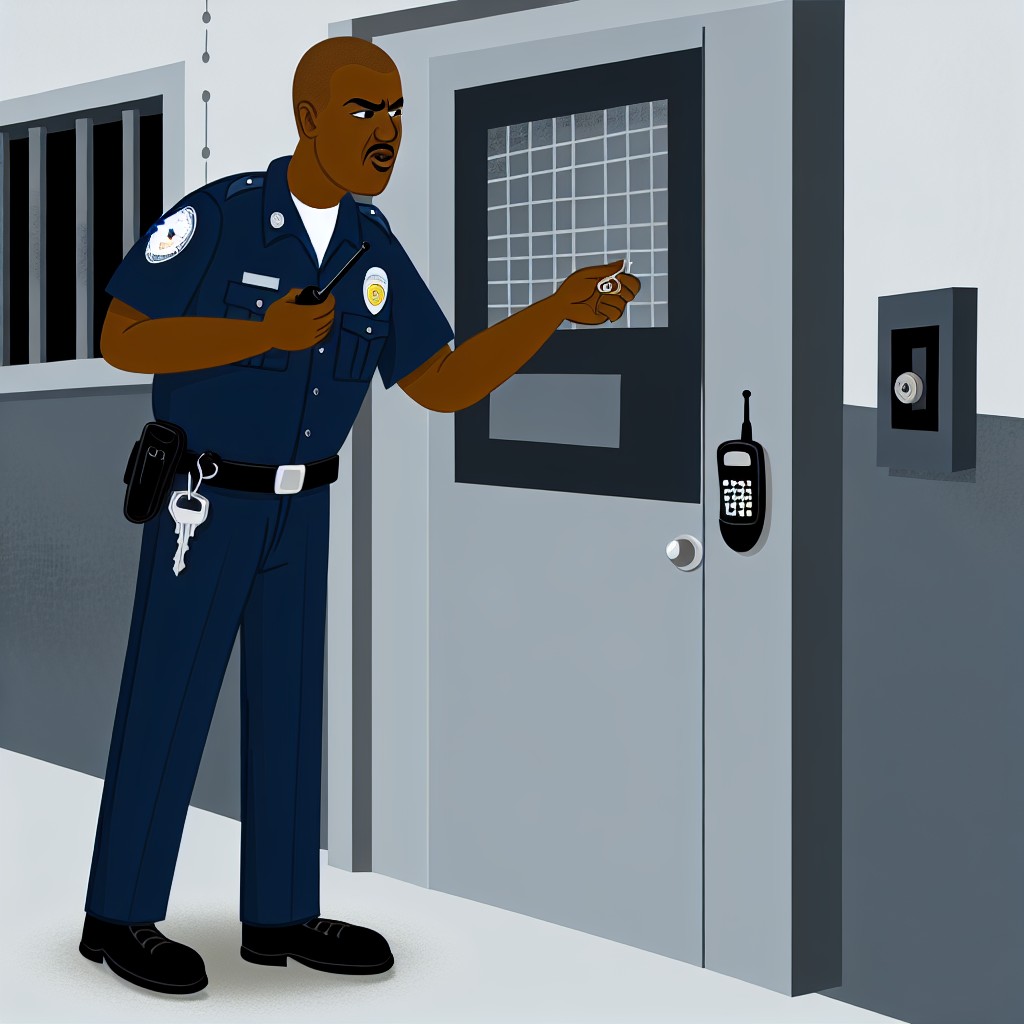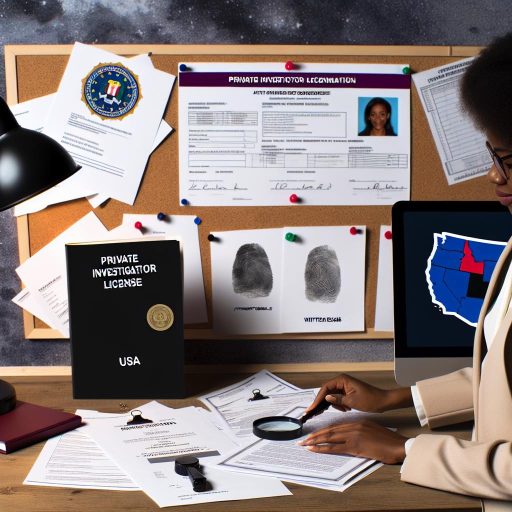Importance of Correctional Officers
Correctional officers are essential in upholding the law and protecting society by overseeing individuals who have been convicted of crimes.
They prevent violence, escapes, and other disruptions that could endanger staff, inmates, or the public.
Legal Responsibilities of Correctional Officers
Correctional officers have a duty to uphold the constitutional rights of inmates, including access to healthcare, protection from abuse, and due process.
They must also follow policies and procedures to ensure fairness and consistency in the treatment of inmates.
Understanding the obligations under the law:
Correctional officers play a crucial role in maintaining order and safety within correctional facilities.
As such, they are required to adhere to a set of legal obligations outlined by state and federal laws.
Understanding these obligations is essential for ensuring that correctional officers perform their duties effectively and ethically.
Legal Framework for Correctional Officers’ Duties:
Correctional officers’ responsibilities are governed by a complex legal framework that includes both state and federal laws.
At the federal level, correctional officers must comply with laws such as the Civil Rights Act of 1964, the Americans with Disabilities Act, and the Eighth Amendment of the United States Constitution.
Specific Laws and Regulations for Correctional Officers:
In addition to federal laws, correctional officers must also adhere to specific state laws and regulations that govern their conduct.
These laws outline the rights of inmates, the responsibilities of correctional officers, and the procedures for maintaining a safe and secure environment within correctional facilities.
- Correctional officers must adhere to the Prison Rape Elimination Act, which aims to prevent sexual abuse in correctional facilities.
- They are also required to follow the guidelines set forth by the National Institute of Corrections, which provide standards for correctional operations.
- Correctional officers must comply with the Code of Professional Conduct for Correctional Officers, which outlines ethical standards and expectations for their behavior.
- They are responsible for upholding the confidentiality of inmate information and maintaining the privacy of individuals within the correctional facility.
- Correctional officers must also ensure that they do not use excessive force or engage in discriminatory practices against inmates.
By understanding and adhering to these laws and regulations, correctional officers can fulfill their duties effectively and contribute to the overall safety and security of correctional facilities.
It is essential for correctional officers to stay informed about changes in laws and regulations that may impact their responsibilities to ensure that they are in compliance with legal standards at all times.
Protecting the rights of inmates:
Respecting the rights of inmates in correctional facilities is crucial for maintaining a fair and just system.
Correctional officers have legal responsibilities to ensure that inmates are treated with dignity and have access to essential services.
Importance of respecting inmate rights:
- Preserves the integrity of the criminal justice system.
- Helps in rehabilitation and reintegration of offenders into society.
- Prevents abuse and mistreatment within correctional institutions.
- Upholds the constitutional rights of individuals, regardless of their status.
Specific legal responsibilities related to inmate rights:
- Access to medical care: Correctional officers must ensure that inmates have timely access to medical treatment and medication as needed. This includes addressing any health concerns or emergencies promptly.
- Protection from abuse: It is the duty of correctional officers to prevent and report any instances of abuse or violence against inmates. This includes physical, emotional, and psychological abuse by staff or other inmates.
- Privacy rights: Inmates have the right to privacy, especially concerning their personal information, medical records, and communication with their attorneys. Correctional officers should respect and safeguard this right.
- Religious freedom: Inmates have the right to practice their religion within the confines of the correctional facility. Correctional officers must accommodate reasonable requests for religious practices and provide access to religious materials and services.
- Legal assistance: Correctional officers have a duty to facilitate inmates’ access to legal assistance, including communication with their attorneys, access to legal resources, and participation in legal proceedings. This is crucial for ensuring a fair trial and due process.
- Visitation rights: Inmates have the right to receive visits from family members, friends, and legal representatives. Correctional officers must ensure that visitation policies are followed while respecting the rights of inmates to maintain relationships outside of the facility.
Protecting the rights of inmates is not only a legal responsibility for correctional officers but a moral obligation.
By upholding these rights, officers contribute to a safe, humane, and effective correctional system that promotes rehabilitation and fosters respect for all individuals involved.
Learn More: Parole Officer: Supporting Rehabilitation
When it comes to maintaining security and order in a correctional facility, correctional officers have a number of legal obligations that they must adhere to.
These responsibilities are crucial in ensuring the safety of both staff and inmates within the facility.
Transform Your Career Today
Unlock a personalized career strategy that drives real results. Get tailored advice and a roadmap designed just for you.
Start NowLegal Obligations
- Correctional officers are required to conduct regular security checks in the facility to identify any potential security threats.
- They must enforce all rules and regulations within the facility to maintain order and discipline among the inmates.
- Correctional officers are responsible for monitoring inmate activities to prevent any illegal behavior or contraband possession.
- They must respond promptly and effectively to any security breaches or disturbances within the facility.
Importance of Proper Procedures
Following proper procedures is essential for correctional officers to prevent escapes and violent incidents within the facility.
- Adhering to established protocols helps in identifying security vulnerabilities before they escalate into major incidents.
- Proper procedures ensure that correctional officers are equipped with the necessary training and tools to handle security threats effectively.
- By following correct protocols, officers can minimize the risk of confrontations with inmates and maintain a safe working environment.
- Implementing proper procedures also helps in reducing the liability of the correctional facility in case of security-related incidents.
Maintaining security and order in a correctional facility is a critical aspect of a correctional officer’s role.
It is essential that they fulfill their legal responsibilities in this area to ensure the safety of everyone within the facility.
Learn More: Counterterrorism Specialist: Historical Perspectives on Terrorism
Reporting and documenting incidents
Correctional officers have a legal duty to report any incidents or violations of regulations.
Failure to report such incidents can lead to legal repercussions for the officer and the facility.
Reporting incidents promptly is crucial for maintaining a safe and secure environment within the correctional facility.
Accurate documentation is essential for legal purposes and investigations related to incidents within the facility.
Proper documentation can serve as evidence in court proceedings and disciplinary actions against inmates or staff members.
Importance of accurate documentation
Accurate documentation provides a detailed record of events, which can be utilized in legal proceedings.
It helps in establishing a timeline of incidents and actions taken by correctional officers in response.
Documentation serves as a tool for monitoring and evaluating the effectiveness of policies and procedures in place.
Proper documentation can help protect correctional officers from false accusations or liability claims.
It ensures transparency and accountability within the correctional facility, promoting trust and compliance with regulations.
Discover More: Role of Sheriffs in Inmate Transport
Ethical Responsibilities of Correctional Officers
Correctional officers are expected to uphold high ethical standards in their profession.
These ethical responsibilities play a crucial role in maintaining the integrity and trust within the correctional system.
- One essential ethical responsibility of correctional officers is to treat all inmates with respect and dignity.
- Officers must refrain from engaging in any form of discrimination or harassment based on race, gender, or any other characteristic.
- Correctional officers are expected to adhere to the principle of fairness and impartiality in their interactions with inmates.
- Officers must maintain honesty and integrity in their dealings with colleagues, superiors, and inmates.
- It is crucial for correctional officers to protect the rights and well-being of inmates, even in challenging situations.
Legal Consequences of Ethical Misconduct
When correctional officers fail to uphold their ethical responsibilities, there can be severe legal consequences, including:
- Abuse of Power: If a correctional officer abuses their authority and mistreats inmates, they can face criminal charges and civil lawsuits.
- Corruption: Engaging in corrupt practices, such as accepting bribes or smuggling contraband, can lead to criminal prosecution and termination from the job.
- Violation of Rights: Violating the constitutional rights of inmates, such as denying access to medical care or legal representation, can result in lawsuits and disciplinary action.
By staying true to their ethical responsibilities, officers can contribute to a safe and just correctional environment.
Discover More: How ICE Agents Collaborate with Other Law Enforcement
Transform Your Career Today
Unlock a personalized career strategy that drives real results. Get tailored advice and a roadmap designed just for you.
Start Now
Correctional officers often collaborate with other law enforcement agencies to ensure compliance with the law.
Working with other agencies:
- Correctional officers may work with local police departments to assist in investigations within the prison.
- Collaboration can also involve federal agencies such as the FBI or DEA when dealing with serious crimes.
- Working with immigration and customs enforcement (ICE) may be necessary in cases involving undocumented immigrants.
Legal responsibilities when collaborating:
- Correctional officers must follow all protocols and guidelines set forth by the collaborating agency.
- Officers should ensure that all transfers of inmates between facilities are conducted in accordance with the law.
- It is crucial for correctional officers to maintain accurate records and documentation when collaborating on investigations.
Ensuring inmate safety during transfers:
- Correctional officers must prioritize the safety and security of inmates during transfers.
- Proper communication with the receiving facility is essential to ensure a smooth transfer process.
- Officers must follow established procedures to prevent any mishaps or security breaches during transfers.
Reporting incidents to the appropriate agencies:
- Correctional officers have a legal responsibility to report any incidents or violations of the law to the relevant agencies.
- Timely reporting is crucial to ensure that proper investigations can be conducted and necessary actions taken.
- Failure to report incidents could result in disciplinary action or legal consequences for the officers involved.
Protecting confidential information:
- Correctional officers must uphold the confidentiality of sensitive information shared during collaborations with other agencies.
- Unauthorized disclosure of information could compromise investigations or put individuals at risk.
- Ensuring that all information is handled securely and only shared on a need-to-know basis is essential.
Training and education requirements:
Correctional officers have a legal obligation to undergo training and education on relevant laws and regulations.
Continuous learning is crucial to stay updated on legal developments in the field.
Correctional officers play a vital role in maintaining safety and security in correctional facilities.
To fulfill this responsibility effectively, they must have a solid understanding of the laws and regulations that govern their work.
Training and education requirements help ensure that correctional officers are equipped with the knowledge and skills necessary to carry out their duties effectively.
Why training and education are essential:
- Depth of knowledge: Understanding laws and regulations is crucial for correctional officers to make informed decisions while on duty.
- Compliance: By undergoing training, officers can ensure that they are following all legal requirements and protocols.
- Professionalism: Continuous learning enhances the professionalism of correctional officers and improves the quality of their work.
Training programs for correctional officers typically cover a range of topics, including constitutional rights, use of force policies, and emergency procedures.
These programs are designed to provide officers with the knowledge and skills they need to respond effectively to various situations that may arise in a correctional setting.
Benefits of continuous learning:
- Stay updated: Legal developments in the field of corrections can change rapidly, and ongoing education helps officers stay current.
- Adaptability: Continuous learning prepares correctional officers to adapt to new challenges and requirements in their work environment.
- Professional development: By investing in their education, officers can enhance their career prospects and opportunities for advancement.
Training and education requirements for correctional officers are essential to ensure that they are prepared to fulfill their legal responsibilities and uphold the highest standards of professionalism in their work.
As a correctional officer, failing to meet legal responsibilities can have serious consequences.
It is crucial to understand the potential legal ramifications of neglecting one’s duties within the correctional system.
Here are some of the major consequences that correctional officers may face if they fail to uphold their legal responsibilities:
- Civil Lawsuits: One of the most common consequences of negligence or misconduct by correctional officers is civil lawsuits filed by inmates or their families. These lawsuits can result in significant financial penalties for the officer and their employing agency.
- Criminal Charges: In cases of extreme negligence or misconduct, correctional officers may face criminal charges. This can lead to imprisonment, fines, and a tarnished reputation that may impact their future career prospects.
- Loss of Job: Failing to meet legal responsibilities as a correctional officer can result in termination from the position. This loss of employment can have long-lasting effects on the officer’s career and livelihood.
- Professional Reprimand: Correctional officers who fail to uphold their legal responsibilities may face disciplinary actions within their employing agency. This can include suspension, demotion, or other forms of professional reprimand.
- Public Scrutiny: Misconduct or negligence by correctional officers can attract negative attention from the media and the public. This can damage the officer’s reputation and erode trust in the correctional system as a whole.
Case examples of correctional officers facing consequences for failing to meet legal responsibilities serve as important reminders of the importance of upholding professional standards:
- In 2018, a correctional officer in a state prison was charged with excessive use of force against an inmate. The officer was criminally charged and ultimately lost their job, facing public scrutiny and a damaged reputation.
- In another case, a correctional officer neglected their duty to properly supervise inmates, leading to a violent altercation that resulted in serious injuries. The officer was sued for negligence and faced significant financial penalties.
- A correctional officer was found to be engaging in inappropriate relationships with inmates, violating ethical codes of conduct. The officer was terminated from their position and faced professional reprimand for their actions.
These examples highlight the real-world implications of failing to meet legal responsibilities as a correctional officer. It is essential for officers to understand and adhere to the laws and regulations that govern their profession to avoid such consequences.
Role of Correctional Officers in the Justice System
Correctional officers have a crucial role in upholding legal responsibilities within the criminal justice system.
Transform Your Career Today
Unlock a personalized career strategy that drives real results. Get tailored advice and a roadmap designed just for you.
Start NowTheir duty to ensure the safety of inmates, staff, and visitors is paramount.
They must prevent violence and maintain order effectively.
It is essential for correctional officers to abide by laws and regulations.
They protect the rights and well-being of those under their care.
Maintaining the integrity of the correctional facility is also vital.
Failure to uphold these responsibilities can result in legal consequences for the officers.
Such failures can also jeopardize the trust and credibility of the entire criminal justice system.
By understanding and adhering to their legal obligations, correctional officers contribute to a fair and just system.
This system promotes rehabilitation, safety, and respect for all individuals involved.
Upholding these responsibilities is not just a job requirement but a moral obligation.
Correctional officers are called to serve with integrity and professionalism.
They must continually educate themselves on legal standards.
Remaining vigilant in enforcing rules and policies is crucial.
All individuals should be treated with dignity and respect.
By doing so, they play a vital role in creating a safe and secure environment.
This environment is essential within correctional facilities.
They also uphold the values of the criminal justice system.
The importance of correctional officers’ legal responsibilities cannot be overstated.
Their commitment to these responsibilities is essential for ensuring fair and effective operations.
Promoting rehabilitation and well-being for those in their care is critical.
Transform Your Career Today
Unlock a personalized career strategy that drives real results. Get tailored advice and a roadmap designed just for you.
Start NowAdditional Resources
Correctional Officers and Bailiffs : Occupational Outlook Handbook …
Police and Detectives : Occupational Outlook Handbook: : U.S. …
[E-Books for Sale]
The Big Book of 500 High-Paying Jobs in America: Unlock Your Earning Potential
$19.99 • 500 High-Paying Jobs • 330 pages
Explore 500 high-paying jobs in America and learn how to boost your career, earn more, and achieve success!
See All 500 High-Paying Jobs of this E-Book
1001 Professions Without a Degree: High-Paying American Jobs You Can Start Now
$19.99 • 1001 Professions Without a Degree • 174 pages
Discover 1001 high-paying jobs without a degree! Unlock career tips, skills, and success strategies for just $19.99!




